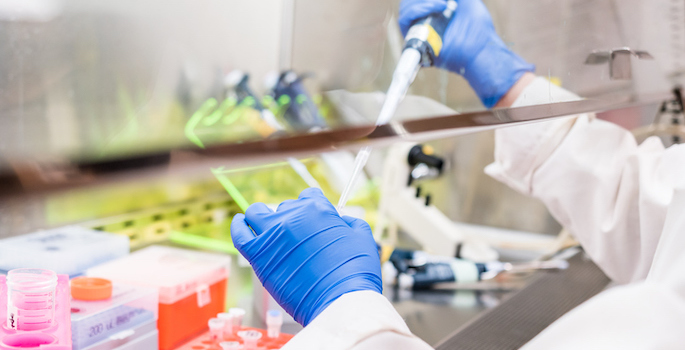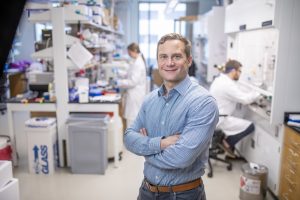
John Wilson, associate professor of chemical and biomolecular engineering at Vanderbilt University, has received a $3 million grant from the National Cancer Institute to develop technology that seeks to boost a person’s immune system to better fight cancer.

Wilson is the Principal Investigator of the five-year grant. He specializes in the study of cancer immunotherapy and the use of cancer vaccines, which take small fragments of the proteins that are in a tumor and packages them in a way that makes them more easily identifiable by the immune system, which then generates T cells that find and eventually destroy the tumor.
“What this grant will do is develop a new technology to help package and display the specific part of the protein from tumors in a way that boosts the ability of the immune system to generate the right type of T cells to fight the cancer,” said Wilson, a 2022 Chancellor Faculty Fellow.
He said cancer vaccines have immense potential, but in many cases researchers don’t have the proper tools to make them work.
“We also now recognize that the specific parts of proteins from cancers can vary a lot patient to patient,” said Wilson. “So, we need to have strategies that allow us to really efficiently identify and then package those proteins in a way that is optimum and gives us the best immune response to each patients’ specific tumor.”
About 39.5% of men and women will be diagnosed with cancer at some point during their lifetimes, according to NCI, which is part of the National Institutes of Health. As of January 2019, there were an estimated 16.9 million cancer survivors in the United States. But because of cutting-edge research by Wilson and his Vanderbilt team, NCI projects the number of cancer survivors will increase to 22.2 million by 2030.
“Hopefully this new technology will eventually be translated into the clinic where we can use it as a personalized platform to generate anti-tumor immunity for a given cancer patient,” said Wilson.
Other Vanderbilt collaborators on the grant are Ann Richmond, co-investigator, Department of Pharmacology; Jin Chen, co-investigator, Vanderbilt University Medical Center; Sebastian Joyce, co-investigator, VUMC; Doug Johnson, collaborator, VUMC; and Jessalyn Baljon, graduate student, Vanderbilt biomedical engineering.
Contact: Lucas Johnson, 615-343-0137
lucas.l.johnson@vanderbilt.edu